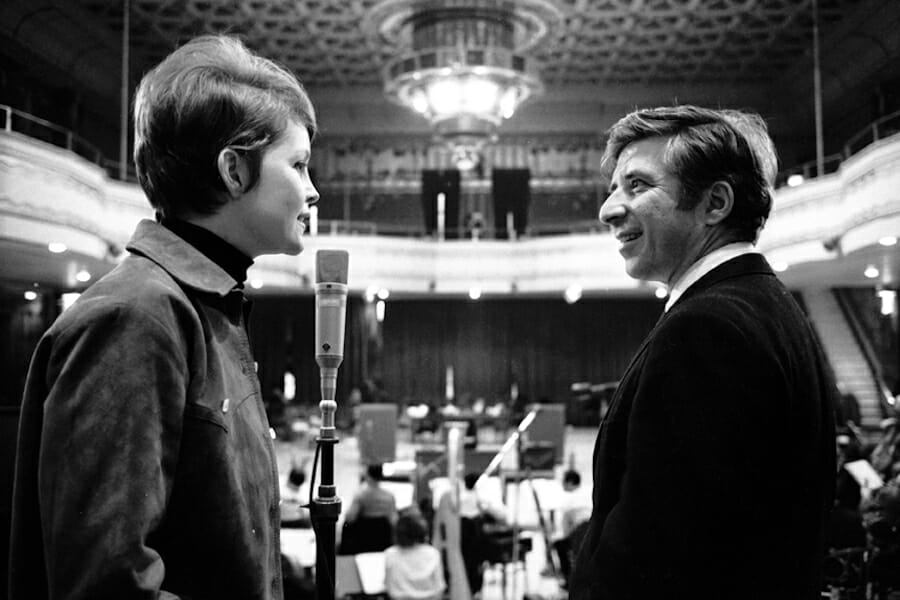
Elmer Bernstein: A Tribute to His Music
Hollywood film composer Elmer Bernstein was a natural for writing the rhythms of the human heart. The staccato, fortissimo, and bebop beats; the drama and the comedy. His death, ten years ago, stopped the works of a marvelous music box. Bernstein is rightly celebrated for his scores for epics and Westerns: The Ten Commandments (1956), The Magnificent Seven (1960), Hawaii (1966), and The Comancheros (1961), to name a few.
“I like the film,” Bernstein said of The Magnificent Seven. “But if you watch it without music it is slow, strangely enough. It develops very slowly. I learned my lesson from de Mille. I thought, ‘I’m going to infuse this film with energy.’ And it worked.” The Magnificent Seven established the template for the galloping, morally dichromatic cowboy movie. It evokes old hands on the trail, chewing bison jerky and spitting yarns about outlaw bulls and loyal dogs. It’s an orchestral yeehaw.
Also feted are his intimate dramas like To Kill A Mockingbird (1962) and Far From Heaven (2002). Both are masterpieces of emotional restraint and character development. To Kill A Mockingbird voices the simplicity and innocence of a child’s mind. Far From Heaven speaks to simmering tensions in a 1950s New England marriage.
“I was scared to death the whole time I was working on this film,” Bernstein said of Far From Heaven, which introduced his music to a new generation of listeners. “I thought to myself, ‘This is dangerous territory. This film is on a cliff edge.’ A bad score could have made this film funny. You wouldn’t have believed a word anyone said. That had a lot to do with my choice of starting simply, with just the piano. I had to exercise a certain kind of restraint.”
Less-known to contemporary audience are Bernstein’s jazz scores, which include The Man with the Golden Arm (1955), Walk on the Wild Side (1962), Sweet Smell of Success (1957). The Man with the Golden Arm features flamboyant trumpet writing. The jazzy themes announce the split between swagger and surrender in Frank Sinatra’s character—a heroin-addicted jazz drummer. Bernstein could sure whip up a savory stew of street beats.
Largely absent from critique in Bernstein’s career are his many comedies, including Three Amigos! (1986), Airplane! (1980), Ghostbusters (1984), Trading Places (1983), Spies Like Us (1985), Meatballs (1979), Animal House (1978), Stripes (1981), Funny Farm (1988), and Canadian Bacon (1995). Some of the films were weak and some were strong but always Bernstein served the tone of the work. He never spoiled the punchlines. He reinforced the satire by writing serious music for silly scenes. “Comedies are very difficult,” said Bernstein. “I think if a comedy is good enough, the composer shouldn’t write funny music. Write music against the comedy and the story is funnier. I did this in Animal House and Airplane!, by writing a mock serious score.”
Airplane! does have its moments of pure overwrought musical fun—like the laughable choral crescendos for Ted and Elaine’s romance scenes, and the unsubtle “danger motif” that narrates the airplane’s continual flight problems. And then there is the grand finale of the score, complete with quotes from Tchaikovsky’s 1812 Overture. But Bernstein’s style in Airplane! is consistently classical and it serves as the ultimate counterpoint to Leslie Nielsen and the rest of the comedy troupe. Every gin needs tonic.
Trading Places and Funny Farm likewise establish a concert hall, baroque feel to the films that underscores the comedy. Ghostbusters is a rare example of a comedy where Bernstein scores characters with specificity. The main theme for the Ghostbusters is a slapstick number fitting for a geeky gang bumbling along a ghoul’s trail.
Bernstein wrote brilliantly till the end. When asked about retirement, he said, “Heaven forfend! Absolutely not.”
He cared for art, not acclaim. “Daddy kept his Oscar for Thoroughly Modern Millie tucked away on a bathroom shelf,” recalled daughter Emilie. “My sister and I used to wish he’d put it in the foyer of our house.” Bernstein helped preserve the art of film music by re-recording classics for album release; his “Film Music Collection” released 13 albums between 1974 and 1979. He also served as president of the Film Music Museum and the Film Music Society.
If there were a score that symbolizes Bernstein’s worldview, it might be The Great Escape. The main title march is a happy rebellion. It immediately evokes Steve McQueen on a motorcycle, kicking up a cloud of dust for the Nazis to choke on. “It’s about indomitability,” said Bernstein of the musical theme. “It’s about the spirit.”
Shortly before his death, Bernstein said, “Music is the soul of life, and each soul sings a different song.” His song was American, close to the people, and full of civility and wit. He was a musician’s Mark Twain.

